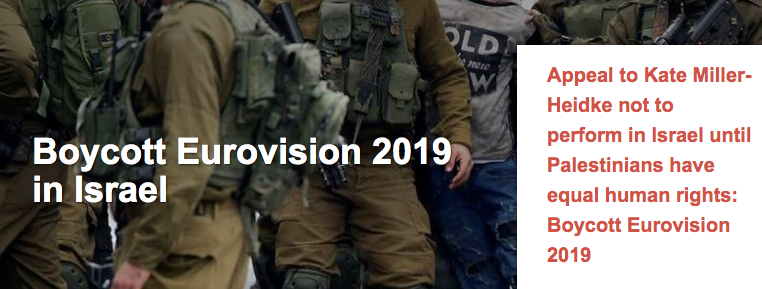
It’s a bit redundant to say Eurovision is a political event. Asking dozens of nations to convene each year for an enormous song competition is bound to cause friction, even if that contest luxuriates in the camp and comical. Still, this year is different. Australia’s Kate Miller-Heidke – along with every other contestant sent to Israel to represent their country – has been asked by pro-Palestinian activists not to perform. As the finale draws closer, calls from the Boycott, Divest, and Sanction (BDS) movement have only grown louder.
[jwplayer dNm1mtOM]
Miller-Heidke was soaring over a Tel Aviv crowd when she secured Australia‘s place in the grand final of the 2019 Eurovision Song Contest. Her rendition of Zero Gravity, light and operatic, paired with aerial dancing as awesome as anything the competition has produced. She beamed after nailing the final note. She knew it was enough. But away from the arena and the adoration, a debate raged: whether Miller-Heidke should participate in the contest at all.
To understand why, we need to jump back to the middle of the 20th century. The creation of Israel and its subsequent wars with neighbouring Arabic nations saw the state claim regions previously within the borders of Egypt, Syria, and and Jordan. But those within the affected territories – collectively known as Palestine – never ceded their ownership.
Essentially, they never wanted to be part of Israel. Although those territories sit within Israeli borders, Palestinians see Israeli control as an illegal occupation, complete with blockades and severe sanctions.
The conflict is ongoing. In May last year, Palestinian authorities said dozens of demonstrators died under Israeli rifle fire during protests in Gaza and the West Bank; Israeli Prime Minister Benjamin Netanyahu defended Israel’s rights to maintain its borders while blaming Palestine’s Hamas government for stirring the demonstrations.
As international scrutiny heightened, Israel was granted an unusual distraction: a clucking pop star whose catchy tune was good enough to win the 2018 Eurovision Song Contest. Netta Barzilai and the success of her song Toy meant her home nation would have first dibs to host the 2019 competition. It was an opportunity Israeli leadership was all too keen to accept. Within days of her win, Netanyahu was filmed dancing alongside the 25-year-old singer.
If Israel needed a glitzy diversion, it certainly got one.
Some Israeli politicians became more overt in their focus on Eurovision. Michael Oren, Israeli deputy minister and one-time ambassador to the U.S., said his nation should take forceful action against Hamas in the Gaza Strip – but only after Eurovision has been and gone.
Hamas must go. Right after our holidays and Eurovision, Israel must evict Hamas from Gaza. The U.S. should back us militarily and diplomatically and, together with Arab states, commit to Gaza’s renewal. Peace in the region is impossible with Hamas in Gaza. Israel is ready to act.
— Michael Oren (@DrMichaelOren) May 5, 2019
This is where BDS comes in. If the Israeli government wants a successful Eurovision to boost to its international image, BDS wants the opposite: a high-profile embarrassment which draws attention to Israel’s treatment of Palestine.
The pressure works – sometimes. Lorde famously canned her 2018 plans to play in Tel Aviv after fans called on her to reconsider the cultural legitimacy her concert would provide. One Israeli advocate was so incensed he put a full-page ad criticising Lorde in The Washington Post.
In Australia, Eurovision protests ramped up when a dozen activists picketed outside the national final on the Gold Coast. The movement now takes the form of online petitions, which call for fans to tune out and for Miller-Heidke to drop her involvement before competing in the finale.

Speaking to SBS on Monday, Miller-Heidke said “everyone feels conflicted by it, everyone feels under pressure.” However, she said she would still compete, given the need for “open dialogue” on the issue.
SBS has a similar stance. A spokesperson told PEDESTRIAN.TV that “SBS has been proudly broadcasting Eurovision for 35 years and we will continue to do so in 2019 because of the spirit of the event in bringing people and cultures together in a celebration of diversity and inclusion through music.”
No contestants have pulled out of the contest due to the BDS campaign, but some have made thinly-veiled comments about the host nation. Hatari, the leather-clad electronic group from Iceland, visited the West Bank soon after touching down. Frontman Tryggvi Haraldsson told the Guardian that to be in the Eurovision bubble “a day after witnessing apartheid in action just an hour’s drive away is the contradiction that we want to be aware of.”
The Eurovision Song Contest Grand Final will go live to air in Australia from 5am, Sunday May 19.



